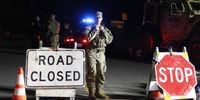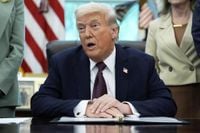On September 15, 2025, President Donald Trump signed a memorandum of understanding in the Oval Office, launching a sweeping new federal initiative aimed at combating crime in Memphis, Tennessee. The move, which includes the deployment of the National Guard alongside a host of federal law enforcement agencies, has sparked intense debate across the city, the state, and even the nation, with supporters hailing it as a necessary intervention and critics warning of potential unintended consequences.
Flanked by Tennessee Governor Bill Lee and U.S. Senators Marsha Blackburn and Bill Hagerty, Trump declared, "This team will deploy the full powers of federal law enforcement agencies ... to restore public safety and get dangerous career criminals off our streets." According to The Center Square, Trump cited alarming statistics: "In 2024, Memphis had the highest violent crime rate, the highest property crime rate, and the third highest murder rate of any city in the nation." The president insisted that previous administrations had failed to act decisively. "A president should have stepped up long ago and saved these cities," he said. "It's not that I wanted to do it. Somebody had to do it and we're doing it in a big way."
The Memphis Safe Task Force, as outlined in the memorandum, will bring together not only the National Guard but also the FBI, Drug Enforcement Administration, Bureau of Alcohol, Tobacco, Firearms and Explosives, U.S. Immigration and Customs Enforcement, Homeland Security, and the U.S. Marshals. The intention is to create a coordinated and robust response to the city’s crime challenges.
Yet, even as federal officials prepared for the deployment, the specifics remained hazy. As of mid-September, 172 members of the Tennessee National Guard were already deployed in Washington, D.C., and Governor Lee told The Daily Memphian that he expected "not many more than 150" National Guard personnel would be sent to Memphis, mostly military police trained in law enforcement. "They would arrive sooner than later," Lee said, emphasizing his preference for using troops already experienced in urban deployments. He also stressed the importance of local input, saying he would "advocate for local leaders to help determine how they are used to support officers fighting crime."
Memphis Mayor Paul Young, a Democrat, made it clear that he had not requested the National Guard. "However, the decision has been made," Young posted on social media. "As your Mayor, my commitment is to work strategically to ensure this happens in a way that truly benefits and strengthens our community." Young’s stance reflects a broader local unease. While some residents and business owners see the deployment as a lifeline, others worry it could exacerbate underlying problems or create new challenges.
Britney Thornton, commissioner representing Orange Mound—one of Memphis’s oldest Black neighborhoods—voiced her concerns to the Associated Press. She warned of a "huge disconnect" between the decision-makers in Washington and the lived realities of Memphians. According to Thornton, “Lax state gun laws combined with a lack of access to basics like education and food are the true drivers of crime.” She cautioned that if the National Guard focuses solely on punitive measures, such as handing out tickets or ramping up traffic stops, it could "put more pressure on working-class individuals" and worsen the situation. Still, Thornton acknowledged a potential upside: "If you’re going to invest those dollars, make it a real investment." She suggested the Guard could empower local organizers to canvass neighborhoods or even help with community cleanup efforts.
Amid the uncertainty, some Memphians have chosen to show hospitality to the incoming troops. Mortimer’s Restaurant, a popular East Memphis bar and grill, offered free or discounted meals for National Guard members. Owner Christopher Jamieson told the Associated Press, "I think our local government definitely needs help." Jamieson described a city where fear of crime has changed daily routines, with most people avoiding being out after dark and his own kitchen closing earlier due to decreased late-night traffic. "We’ve all grown up in it, but we’ve never seen anything like this," he said. The gesture of free meals has garnered support from across the community, with neighbors and soldiers’ families offering to help cover costs. Jamieson hopes the effort will show the Guard that "there are a lot of good people here, and a lot of people who want to see our city fixed and see it safer."
However, not everyone is convinced that a military-style solution addresses the root causes of Memphis’s troubles. Richard Massey, a University of Memphis student and activist, acknowledged the city’s progress in reducing some crime metrics but argued that gun violence remains a persistent problem. In 2023, Memphis recorded more than 390 homicides—a grim milestone. Massey described the deployment as a "Band-Aid solution," saying, "This is exploiting people’s fears and public safety concerns in Memphis." He, like Thornton, called for deeper investments in schools, after-school programs, and affordable housing in underserved neighborhoods.
On the political front, the deployment has become a flashpoint. Republicans, including Senator Bill Hagerty, have praised the decision. "This shouldn't be a partisan issue; this should be something that is our primary goal," Hagerty said. "Certainly, I hope to see Memphis become the safest city in America." State Representative Antonio Parkinson, a Democrat from Memphis, offered a more pragmatic take, suggesting the city could view the deployment as "1,000 pieces of human capital or free labor coming to the city." He added, “Otherwise, we’ll be right back in the same situation again.”
Nationally, the debate has spilled into Congress. According to NBC News, every Democratic member of the Senate Armed Services Committee has urged a hearing with Pentagon leaders about the Trump administration’s growing use of military personnel in American cities. Their letter questions the cost, impact on military readiness, and the effect on public trust. Senator Tammy Duckworth, the lead signatory, stated, “Donald Trump seems determined to deploy our military to police American cities with absolutely zero regard for the lasting impact this will have on readiness, public trust and our national security.” The senators also raised concerns about transparency and legality, noting that Defense Secretary Pete Hegseth, when questioned in June, could not specify the legal authority for such deployments, though he maintained they were constitutional.
Meanwhile, other states are watching closely. Alabama Governor Kay Ivey told Yellowhammer News that her state is in contact with federal officials and stands ready to deploy the Alabama National Guard if called upon. “We’re certainly in touch with the White House about that. We stand ready to send out the Alabama National Guard, whether they’re needed, but right now, we’re on standby. We’ll be ready,” Ivey said. She highlighted Alabama’s own Metro Area Crime Suppression Unit as a local initiative already seeing results, reinforcing her commitment to public safety as a top priority.
As Memphis braces for the arrival of federal troops, the city stands at a crossroads. The coming weeks will reveal whether this unprecedented federal intervention can deliver the safety residents crave or whether, as some warn, it will merely mask deeper problems that require longer-term solutions.


